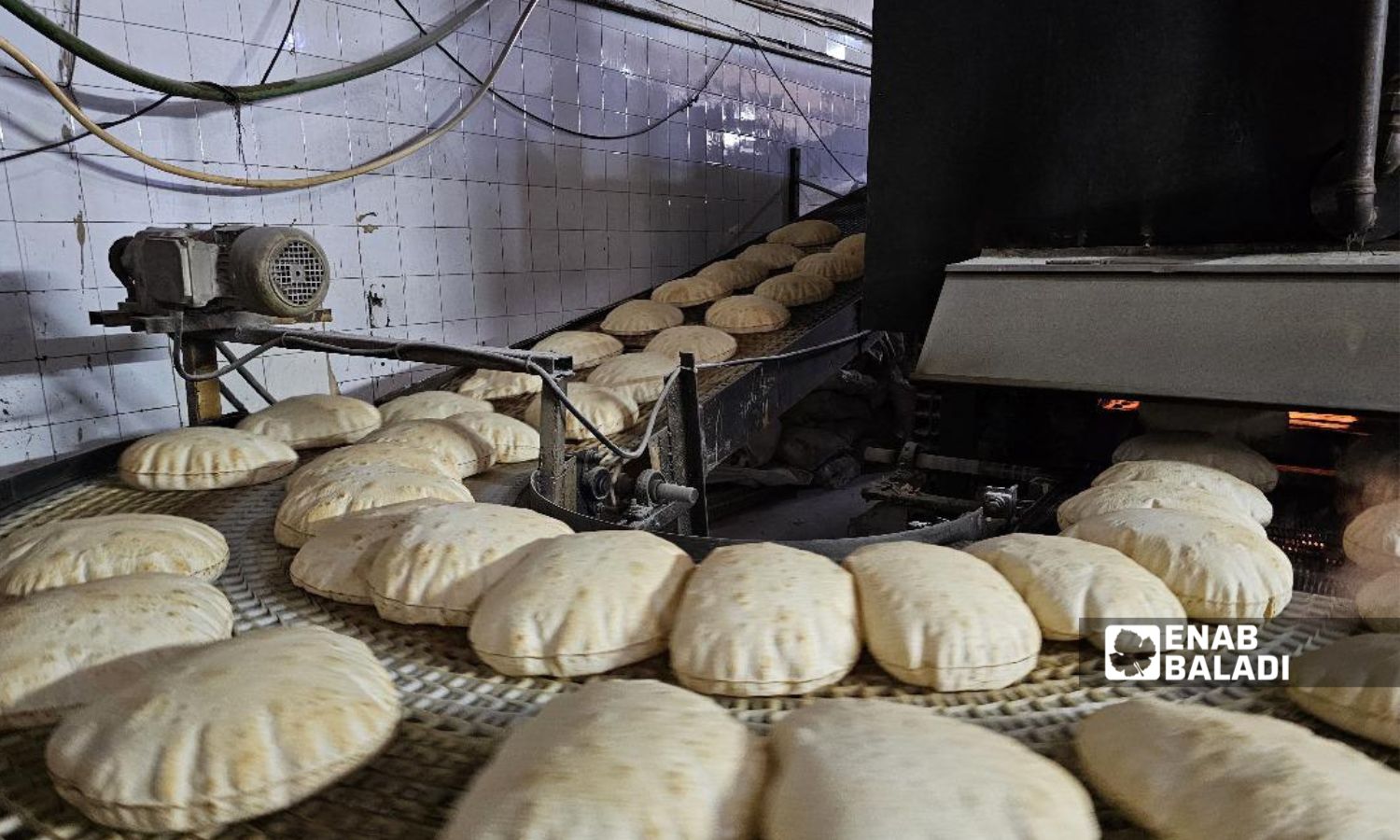



Despite the increase in the number of loaves in a bread bundle following the recent amendments approved by the Ministry of Internal Trade in Syria, the nutritional value of a loaf of bread has decreased, affecting the feeling of satiety among consumers.
Bread is significant as it is the most available and least expensive food, especially with rising food prices and the reduced purchasing power of many families struggling to provide alternative foods.
The bread bundle has been freed from the restrictions of the smart card since the fall of the previous Assad regime, becoming 1500 grams instead of 1100, with 12 loaves rather than 7, at a selling price of 4000 Syrian pounds instead of 400.
In contrast, the diameter of a single loaf of bread has decreased from 38 centimeters to 28, as explained by the manager of the Mezzeh 4 reserve bakery, Ziad al-Zoubi, to Enab Baladi.
To preserve the wheat reserves in Syria, the Ministry of Internal Trade and Consumer Protection in the interim government in Damascus lowered the weight of a bread bundle on February 4 to 1200 grams, with a diameter ranging from 25 to 28, without changing the number of loaves, according to the statement by the general director of the Syrian Bakeries Institution, Mohammed al-Sayyadi, to the “Economy Today” website.
The quality of flour used in bread production has improved, with bakeries now receiving bags of white, fine flour, whereas they previously used darker, coarser flour. This change has positively impacted the appearance of the loaf and helped workers produce the bread to the new specifications, according to al-Zoubi.
Production lines in Syrian bakeries are not equipped with the required standards to produce bread according to the new specifications, according to al-Zoubi. Therefore, their specifications have been manually modified by bakery technicians to achieve a quality that meets the standards.
Due to the changes in the specifications of bread regarding weight, number of loaves, and size, individuals are compelled to consume 4 to 6 loaves daily instead of just 2 to achieve the same level of satiety. This leads to an increased overall consumption of bread and starches without compensating for the lack of other nutrients, as explained by nutrition expert Alaa al-Masri to Enab Baladi.
Al-Masri clarified that the reduction in the thickness of the loaf has affected its consistency and dryness, making it less capable of retaining moisture and consequently drier. This results in less chewing, quicker feelings of hunger, and increased bread consumption without adequate balance with other nutrients, leading to higher carbohydrate intake, which may cause fluctuations in blood sugar and chronic feelings of hunger.
The current loaf contains between 250 to 270 calories and 50 to 55 grams of carbohydrates, while an individual’s daily caloric needs range between 1800 and 2500 calories, with carbohydrates making up 50 to 60% of total calories, or between 225 and 325 grams, according to al-Masri.
Relying heavily on bread as a primary food source, without diversifying the diet, leads to numerous health issues, as pointed out by nutrition expert Alaa al-Masri to Enab Baladi in several points:
This situation worsens for individuals suffering from chronic illnesses like diabetes and heart disease. Consuming large amounts of bread may lead to sharp fluctuations in blood sugar levels and increase the risk of weight gain, fat accumulation, high blood pressure, and cholesterol, according to al-Masri.
Despite the ongoing struggles of Syrian families with deteriorating economic and living conditions, nutrition expert Alaa al-Masri offers some advice to help individuals improve their nutrition and benefit from bread more effectively through:
In order to improve the nutritional value of bread without affecting its cost and ensure citizens have access to healthier and more valuable food in difficult circumstances, nutrition expert Alaa al-Masri directed some recommendations to specialists and decision-makers.
Al-Masri stated that the state-subsidized bread can be improved by adding whole wheat flour or legumes to the dough to increase its fiber and protein content, contributing to increased satiety and better digestion. It is also advisable to fortify bread with iron and calcium to combat deficiencies of these minerals in the body, especially under current conditions.
Moreover, she emphasized the need to encourage bakeries to adopt natural fermentation methods, as these can enhance the nutritional value of bread and improve digestion through natural yeasts, while also potentially reducing the excessive consumption of refined carbohydrates.
Finally, al-Masri underscored the importance of consumer awareness, which is as critical as production improvement. There should be awareness programs for consumers on how to consume bread in balance with other food sources like fava beans or dairy to ensure comprehensive and healthy nutrition.
if you think the article contain wrong information or you have additional details Send Correction